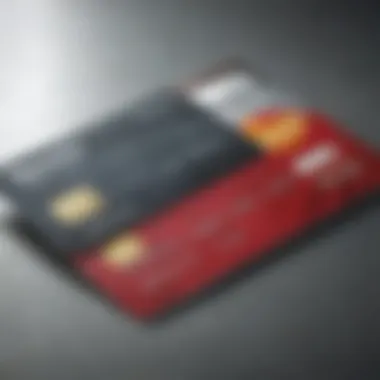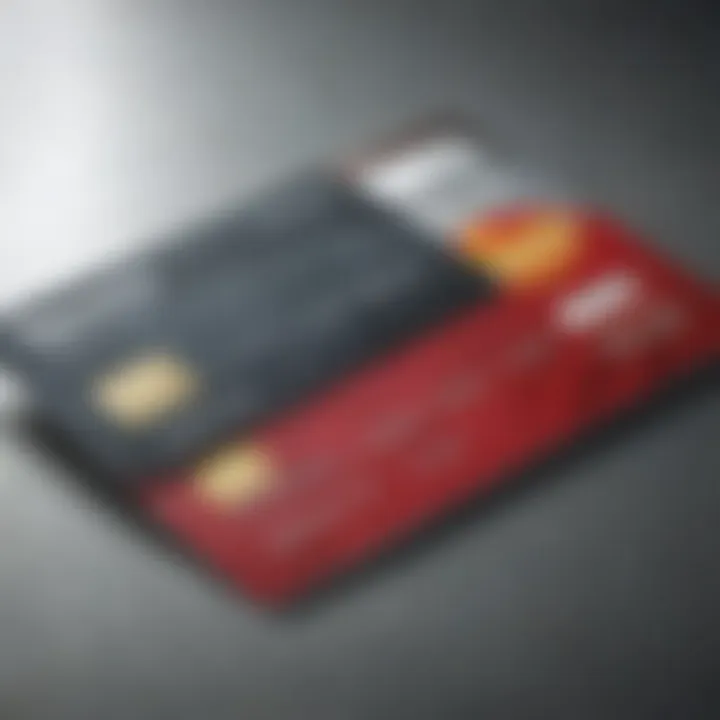Exploring Debit Cards: Features, Benefits, and Risks


Intro
The modern financial landscape is marked by a myriad of payment options, with debit cards emerging as a cornerstone of everyday transactions. Unlike credit cards that enable borrowing up to a limit, debit cards are tightly linked to an individual's bank account, facilitating payments directly from available funds. This article seeks to unravel the complex dynamics of debit cards, highlighting their multifaceted characteristics and examining their implications for consumer behavior and personal finance management.
Understanding debit cards goes beyond just knowing how they work; it involves grasping the nuances of their features, the potential benefits they offer, and the risks that may accompany their use. With a variety of types available on the market—from standard cards to those offering cash-back rewards or specific retailer perks—consumers must navigate a landscape of choices that cater to distinct needs and lifestyles.
As we delve into this exploration, it becomes clear that debit cards are instrumental in shaping not only spending habits but also broader financial strategies. Their apparent simplicity belies the subtleties of their operation, making an informed understanding crucial.
"The choice of a debit card can reflect one's financial philosophy—whether it’s about managing spending responsibly or tapping into specific rewards that enhance purchasing power."
Through dissecting key features, security concerns, and comparisons with alternative payment instruments, we aim to provide a comprehensive guide for a diverse audience. Whether you’re a casual user grasping for basic knowledge or a seasoned financial professional looking to refine your expertise, this article offers insights to sharpen your understanding of debit cards against a backdrop of financial management principles.
Overview of Debit Cards
The significance of debit cards in today’s financial landscape cannot be understated. They serve not only as a medium for transactions but also as a fundamental tool for personal finance management. Understanding the nuances of debit cards is vital for anyone looking to enhance their financial literacy and navigate modern payment methods effectively.
Definition and Basic Functionality
At their core, debit cards are a straightforward financial instrument. They allow users to access funds directly from their bank accounts to make purchases or withdraw cash. Unlike a credit card, which provides a line of credit that can lead to debt, a debit card gives you the peace of mind that you are only spending what you have.
This operating principle extends to various transactions, whether online or in brick-and-mortar stores. Usually, when a debit card is swiped, the amount is immediately deducted from the linked bank account. This provides an instantaneous reflection of one's spending habits, potentially promoting better financial management habits among users.
Historical Context and Evolution
Diving back into the chronicles of finance, the evolution of debit cards marks a transformation in how consumers interact with money. Introduced in the late 20th century, debit cards emerged as an alternative to physical cash and checks. They became a practical response to the growing demand for convenience among consumers.
In the early days, transactions using debit cards were primarily limited to physical retailers. However, as technology advanced, the functionality of these cards increased significantly. Online shopping spurred this growth, leading banks and financial institutions to innovate the capabilities of debit cards. Today, they often include features like mobile payments, contactless transactions, and even loyalty rewards, making them an integral part of daily financial activities.
The ongoing changes in consumer behavior further inform the dynamics of debit card usage. As this payment method becomes more ingrained in our lives, understanding its evolution helps frame the future of financial transactions. Awareness of where debit cards came from, and how they've changed, gives users a better appreciation of their role in daily financial management.
Types of Debit Cards
When it comes to managing personal finances, understanding the variety of debit cards available is crucial. Each type of debit card serves a unique purpose, catering to different consumer needs and preferences. This section will delve into the characteristics of the various debit card types, highlighting their specific benefits and considerations. Grasping these nuances can aid consumers in making informed decisions that align with their financial goals.
Standard Debit Cards
Standard debit cards link directly to a bank account, making them a common choice for everyday transactions. They are straightforward—simply swipe, enter your PIN, and the purchase amount is deducted from your account balance. This mechanism plays a pivotal role in budgeting, as users can only spend what they have.
The ease of use associated with standard debit cards makes them attractive. However, some might overlook the potential for fees associated with ATM withdrawals or foreign transactions. Knowing those details can save money in the long run.
Benefits:
- Convenient access to funds during transactions.
- Promotes responsible spending, helping to avoid debt.
Prepaid Debit Cards
Prepaid debit cards operate as an alternative to standard debits. Instead of being linked to a bank account, users load a specific amount of money onto the card beforehand, which can then be spent as desired until the funds run out. This feature makes prepaid cards quite appealing for budgeting purposes, especially for those keen on controlling their spending.
Prepaid cards also serve a great function for those without access to traditional banking. However, it's essential to be aware of the potential fees, like activation or monthly maintenance fees, that some issuers charge. Not all prepaid cards are created equal, so consumers must research which offer the best terms.
Considerations:
- Great for budgeting and controlling spending.
- May come with various fees that could reduce loaded funds.
Secured Debit Cards
Secured debit cards are a specialized option, typically aimed at individuals looking to rebuild or establish credit. They require the user to deposit a certain amount of money, which serves as collateral. Essentially, the card functions similarly to a standard debit card, but with the added ability to report to credit bureaus. For financial novices or those with prior credit issues, secured cards can be a pathway to improved credit standing.
While they are beneficial for credit-building, it's worth noting that users may not access the funds they deposit until they close the account. This condition may limit liquidity, making it essential to maintain an accurate balance.
Benefits:
- Assists in building or rebuilding credit scores.
- Responsible use can pave the way for future credit opportunities.
Rewards Debit Cards


Rewards debit cards take the standard model a step further by offering incentives for everyday purchases. Users can earn points, cashback, or discounts based on their spending. This addition makes them an enticing option for consumers who prefer debit transactions but also want to reap rewards akin to credit cards.
However, it’s essential to scrutinize the rewards program specifics; some might have spending limits or specific categories where rewards apply. Moreover, the user must be diligent in paying off any potential overdrafts that might occur from engaging with these cards, as those can lead to financial pitfalls.
Considerations:
- Ideal for those seeking to maximize everyday spending.
- Understanding the terms is crucial to truly benefit from the program.
The Mechanics of Usage
Understanding how debit cards function is crucial for both everyday consumers and financial professionals. This section sheds light on the operational underpinnings of debit cards, revealing not only how they work but also the insights into consumer habits and security implications that come with their use.
How Debit Cards Work
At their core, debit cards are financial tools that allow users to access funds directly from their linked bank accounts. This means that when a cardholder makes a purchase, the money is withdrawn instantly rather than accruing debt like with credit cards. Think of debit cards as the bridge connecting a person's cash to the marketplace, offering both convenience and real-time financial monitoring. The technology behind debit cards extensively utilizes point-of-sale (POS) systems, ensuring secure transactions and instant updates to account balances.
For instance, when swiping a debit card at a grocery store, the POS terminal sends a request to the bank to confirm the available balance. If sufficient funds exist, the transaction is processed, and the account is debited immediately. Beyond the surface, the integration of electronic payment systems is an essential part of modern banking, allowing consumers to maintain tighter control over their budgets.
Linking to Bank Accounts
Linking a debit card to a bank account is often straightforward but holds significant importance. When someone applies for a debit card, it's tied to a checking account, or sometimes, a savings account. This linkage plays a vital role in the usability of debit cards because it determines how much a user can spend. Here’s what you should know:
- Immediate Access: Users can spend only what they have, reducing the temptation to overspend, a common pitfall seen with credit cards.
- Instant Transfers: Funds are available immediately after a user makes a deposit, enhancing liquidity for consumers.
- Direct Deposit: Many employers directly deposit paychecks into employees' checking accounts, making it even easier to manage spending through debit cards.
However, one should be mindful of maintaining sufficient balances. A low account balance may result in the denial of transactions or overdraft fees, depending on the bank’s policies. Financially savvy individuals will want to evaluate their spending habits and maintain a buffer in their accounts to avoid such issues.
Transaction Processes
The process of completing a transaction with a debit card is often quick and efficient, yet the mechanisms that underlie these transactions carry importance worth noting. Here’s how it unfolds:
- Card Presentation: The cardholder presents the debit card, either by swiping, inserting, or tapping it at the point of sale.
- Authorization Request: The terminal sends an authorization request to the bank or the card issuer, indicating the amount to be charged.
- Verification: The bank checks to see whether the account has sufficient funds. This step is crucial as it prevents overdraft situations.
- Transaction Approval/Decline: If sufficient funds exist, the transaction is approved, and the money is deducted from the user's account. If not, an error is communicated, often leading to embarrassment for the consumer.
- Final Processing: The transaction is queued for settlement, typically occurring within a few business days.
The reliability and speed of these processes showcase why consumers increasingly prefer debit cards over cash or checks. Customers can make purchases at countless retailers without carrying cash, which is especially handy in a world that increasingly prioritizes speed and efficiency. As such, understanding these transactional mechanics provides key insights into consumer behavior and personal finance management.
"Debit cards offer the convenience of electronic transactions while maintaining the discipline of spending within one's means.”
Navigating the mechanics of debit card usage offers a clearer picture of how these tools can significantly shape financial behavior and planning.
Advantages of Using Debit Cards
Debit cards present a myriad of advantages that make them indispensable in modern personal finance. In comparison to other payment methods, they offer unique benefits that prompt many consumers to adopt their use. The simplicity of managing finances with a debit card cannot be overstated. When one uses debit cards, they access their own funds directly, which allows for better financial discipline, a limited risk of debt accumulation, and reduced fees and costs compared to credit options. Let's unpack these advantages further.
Financial Discipline
One of the most notable advantages of debit cards is the enhancement of financial discipline. Every time you swipe, tap, or insert your debit card, you are using your own money. This creates an immediate tangible connection to your spending habits. Unlike credit cards, where one can easily lose track of how much they’ve charged on a whim, debit cards don't allow for such financial slippage.
Being directly linked to existing funds forces one to monitor their spending closely. According to a study published by the Federal Reserve, individuals using debit cards tend to keep a tighter rein on their budgets. This intentionality encourages thoughtful spending and fosters responsible financial behavior.
- Immediate feedback: When you make a purchase, your account balance updates instantly, making it hard to forget your spending.
- Avoiding impulse buys: Many people find themselves thinking twice before making a transaction with their own money, thus quelling those impulsive splurges.
Avoiding Debt
Another significant advantage of debit cards is their role in avoiding debt. With credit cards, it's all too easy to overspend and find oneself in a bind when the bill arrives. Debit cards serve as a buffer against this. The spending limit is constrained by the amount of money available in the account. When you use a debit card, you can't spend money that isn't there, which can be a saving grace for many consumers.
This aspect promotes a cash-only mindset without the need to physically carry cash. Consumers can enjoy the convenience of plastic while avoiding the pitfalls associated with credit, such as high-interest rates and growing debt balances. Furthermore, without the temptation to borrow against future income, many users experience an overall reduction in financial stress.
“Living within your means isn’t just a principle; it’s a vital skill for long-term financial health.”
Lower Fees and Costs
Examining the costs associated with debit cards unearths yet another advantage. Generally, debit cards incur fewer charges compared to credit cards. Many financial institutions offer free checking accounts that include debit cards with no annual fees. In contrast, credit cards can carry hefty fees for both annual membership and late payments.
Moreover, many debit cards do not charge interest, which means that every purchase made is free from monthly interest rate accrual, a common headache for credit card users.
- No interest: Debit card transactions are straightforward; what you spend is what you pay with no interest attached.
- Fewer penalties: Late fees and other charges often plague credit card holders, while debit card users find themselves less vulnerable to such penalties.


In summary, debit cards offer financial discipline, reduce the risk of debt, and minimize fees, making them a viable option for anyone looking to maintain a careful and conscious financial lifestyle. With their practical advantages, debit cards remain an essential tool in personal finance management, ensuring that consumers navigate their finances effectively.
Disadvantages and Risks
When considering the impact of debit cards on personal finance, it’s equally essential to recognize the drawbacks that come with their use. While they provide convenience and help maintain financial discipline, there are several disadvantages and risks that can affect users. It is important for anyone—whether a casual consumer or a seasoned investor—to be aware of these potential pitfalls.
Lack of Credit Benefits
One of the significant disadvantages of debit cards is their inability to build credit. Unlike credit cards, which can enhance a user's credit score through responsible usage, debit cards merely tap into available funds without offering credit-related features. This can be a real deterrent for individuals looking to improve or maintain their credit standing. For instance, a young adult who uses a debit card exclusively may find they lack the credit history necessary for loans or mortgages down the line, despite managing their finances well. In today’s financial landscape, where securing loans is often tied to credit history, this limitation represents a considerable downside. Additionally, debit cardholders miss out on perks such as cash back, reward points, and low-interest financing that many credit cards provide.
Fraud Risks
Another crucial risk associated with debit cards pertains to fraud. While most financial institutions have measures in place to protect users, the reality is that debit cards can be more vulnerable to fraudulent transactions compared to credit cards. When a debit card is compromised, the funds are drawn directly from the user’s bank account, which can lead to immediate financial loss. Many individuals do not realize that reversing these transactions can take time and effort, meaning they may be left without access to their money until the issue is resolved.
Moreover, unlike credit cards, debit cards may not offer robust consumer protections. For example, while the Fair Credit Billing Act provides comprehensive fraud protection for credit card users, debit cardholders often lack similar safeguards. This difference in protection can create an unwelcome feeling of unease for users who realize their vulnerability when using a debit card.
Overdraft Fees
Lastly, overdraft fees represent another challenge linked to debit card usage. If a user spends more than their available balance, many banks will allow the transaction to go through, resulting in an overdraft. This practice might seem convenient at first, but the fees associated can quickly pile up. Some banks charge hefty fees for this service, which can take many by surprise, particularly those who believe they are maintaining a careful watch on their spending.
To avoid these fees, debit card users need to closely monitor their accounts and transactions, which is an additional burden. A scenario where one might spend slightly more than expected becomes a lot more complicated when fees are tacked on, sometimes catching users off guard.
In essence, while debit cards offer numerous advantages, the associated risks should not be overlooked. Users must juggle the convenience that comes with debit cards against these potential dangers, making informed decisions regarding their usage.
"Understanding the potential disadvantages can help users navigate their finances more effectively and ensure they are using debit cards to their maximum benefit."
Ultimately, consumers must remain vigilant in managing their debit card usage to minimize these risks, ensuring that financial discipline does not come with unexpected costs.
Security Considerations
In today's fast-paced financial landscape, security considerations surrounding debit cards have become paramount. As these cards are frequently linked directly to a consumer's checking account, ensuring safety is not just a preference but a necessity. This section aims to shine a light on the significance of security measures, providing a robust understanding of how they protect individuals from potential risks.
Protecting Personal Information
One of the primary concerns for any debit card user is the safeguarding of personal information. In an era where data breaches seem almost common, the responsibility lies not just with financial institutions but also with consumers themselves. Awareness is the first line of defense. Users must be vigilant about where and how they use their cards.
Common practices to protect personal information include:
- Using Secure Networks: Avoid public Wi-Fi when accessing bank accounts or conducting transactions. If necessary, utilize a VPN for an additional layer of security.
- Keeping Software Updated: Regular updates on devices can thwart potential threats from malware that may compromise account information.
- Strong Passwords: Utilizing complex, unique passwords for online banking to protect against unauthorized access is critical.
"The importance of protecting personal information isn't just a precaution; it's a fundamental right in the digital age."
Security features offered by banks, such as two-factor authentication, can greatly minimize risks. When consumers combine these features with proactive practices, they can significantly bolster their card security efforts.
Monitoring Transactions
Monitoring transactions is another pivotal aspect of ensuring debit card security. Keeping an eye on daily or monthly statements can reveal discrepancies that might indicate fraud or errors. Not all eyes on the balance is necessarily good enough; timeliness in detection can be the difference between recovery and loss.
Implementing regular transaction review can empower consumers to:
- Identify Unauthorized Charges: Catching an unfamiliar transaction early allows for immediate reporting to the bank, often minimizing loss.
- Manage Budgeting: Regular review can also aid in monitoring spending habits, thus supporting better financial management.
- Utilize Mobile Apps: Many banking apps offer alerts for transactions, providing an additional layer of monitoring without the need for constant logins.
Comparative Analysis with Other Payment Methods
In a marketplace increasingly dominated by various payment methods, comparing debit cards to others such as credit cards, cash transactions, and digital wallets becomes essential. Understanding these comparisons not only illustrates how debit cards fit into broader financial ecosystems but also guides users in selecting the most suitable payment method for their needs.
Debit Card vs. Credit Card
When assessing debit cards against credit cards, the most striking difference lies in the fundamental nature of the transactions. Debit cards allow individuals to spend money that is already in their bank accounts, essentially making them an extension of one's checking account. This simplicity promotes financial discipline since transactions are constrained by existing funds, which can prevent overspending.
On the flip side, credit cards enable users to borrow money up to a certain limit, a tempting feature for some. This can facilitate larger purchases and potentially build credit history. However, juggling repayment can lead to debt if not monitored closely. Many consumers find themselves in situations where they indebt themselves, all while swiping their cards without a second thought.
When it comes to fees and interest, credit cards often impose monthly charges and high-interest on outstanding balances. Debit cards, in contrast, typically incur fewer costs, aside from possible ATM fees or overdraft penalties. In essence, for those looking to maximize their spending without diving into debt, debit cards consistently emerge as a favorable option.
Debit Card vs. Cash Transactions


In the debate between debit cards and cash, one might argue that cash transactions provide a tangible sense of control over finances. Many people find that handling physical money gives them a clearer picture of their expenditures. When you pay with cash, you see the money leaving your hands. It's a visceral, operational experience that sometimes makes it easier to stick to a budget.
However, cash comes with its own set of constraints. Debits can be used worldwide without the need to carry large sums of money, reducing the hassle of money management while preventing loss or theft. Furthermore, in a world that is leaning ever more towards digital solutions, using cash can sometimes feel like being stuck in the past. Also, some merchants, especially online, may not even accept cash, making debit cards a more practical solution in many scenarios.
Debit Card vs. Digital Wallets
Digital wallets, like PayPal or Apple Pay, have surged in popularity, particularly among younger users who appreciate their convenience. When comparing them to debit cards, both allow for swift transactions, yet their modes of operation diverge slightly.
Debit cards are linked directly to bank accounts, thus reflecting real-time account balances. In contrast, digital wallets often require a linked bank account or card, and may handle multiple forms of payment. However, using digital wallets efficiently depends on having steady internet access, which isn’t always guaranteed.
In terms of security, digital wallets employ advanced encryption and often require additional layers of authentication, making them appealing to many. Debit cards, while equipped with security features, do not offer the same level of protection from fraudulent transactions in certain cases, especially when users become victims of phishing or data breaches.
In summary, while all these payment methods have benefits and drawbacks, understanding the landscape can empower consumers to make informed decisions tailored to their financial habits and lifestyle.
Ultimately, each payment method offers unique advantages that cater to different preferences and circumstances, making it crucial for consumers to evaluate their options carefully.
Consumer Behavior and Preferences
Understanding consumer behavior and preferences when it comes to debit cards is pivotal in grasping the bigger picture behind their usage in personal finance. It's not merely about the mechanics of how they work but diving deep into why individuals opt for a debit card over other payment methods. Factors such as convenience, security, and personal financial management play significant roles in shaping consumer choices. Moreover, recognizing trends in usage can provide invaluable insights into market dynamics and predict future behaviors.
Factors Influencing Choice
When consumers are faced with a choice of debit cards, several key factors influence their decision-making process:
- Ease of Use: In an age dominated by speed and convenience, the ability to access funds quickly is paramount. Debit cards allow users to transact without delay, making them a go-to choice for everyday purchases.
- Fees and Charges: Potential cardholders often scrutinize the fees associated with various debit cards. While some charge monthly maintenance fees, others may offer zero-fee options. Such distinctions can sway preferences significantly.
- Rewards and Benefits: With the rise of rewards debit cards, consumers may lean towards cards offering cashback, points, or travel benefits. The allure of getting something back can be a strong motivator.
- Brand Trust: Loyalty to a particular bank or financial institution can heavily influence choice as consumers prefer to stick with brands they recognize and trust. This is crucial in a market where confidence in digital transactions can't be understated.
- Security Features: In today's world, data security is a top concern. Debit cards with additional security features such as fraud protection and biometric authentication are more likely to attract users wary of potential breaches.
Trends in Debit Card Usage
Examining the trends in debit card usage reveals shifts in consumer inclinations and the broader financial landscape:
- Increased Popularity Among Younger Generations: Younger consumers, particularly millennials and Gen Z, are shifting away from cash and traditional credit cards toward debit cards viewing them as more manageable and less risky.
- Rise of Contactless Payments: The trend toward contactless transactions has surged, especially in the wake of the pandemic. Consumers appreciate the speed and hygiene factor that contactless debit cards provide.
- Digital Integration: Many users are opting for debit cards that integrate seamlessly with digital wallets and apps, reflecting the hybrid nature of spending in today’s environment. This adaptability is becoming increasingly important as technology evolves.
- Growing Focus on Financial Management: As individuals become more financially savvy, there's a parallel trend towards tools that help in budgeting and tracking spending. Debit cards with associated mobile apps that provide insights can attract a more analytical audience.
"Consumer preferences are not just about what they buy, but how they manage their money and their relationship with financial institutions."
The Future of Debit Cards
The landscape of debit cards is evolving at a promising pace. To grasp the implications, one must look at how these instruments are adapting to technological advancements and shifting consumer preferences. The future of debit cards is not just about convenience but also involves enhanced security measures, integrations with digital ecosystems, and the expansion of functionalities that resonate with modern financial behaviors.
Technological Innovations
In the realm of debit cards, technology serves as both the driving force and the backbone. One cannot ignore the impact of mobile payment solutions, which have transformed how individuals interact with their finances. Near Field Communication (NFC) technology has made tap payments a breeze. Picture this: you’re standing at a coffee shop in the morning rush, and with a quick tap of your card on the reader, you’re done—no need to fumble for cash or wait for card processing.
But it doesn’t stop there. Enhanced biometric security features, like fingerprint and facial recognition, are becoming increasingly prevalent. These innovations not only streamline the payment process but also bolster security. Consumers want assurance that their hard-earned money is safe, and banks are responding by investing heavily in these technologies.
"Innovation is the lifeblood of the financial sector; it keeps institutions competitive and customers happy."
Moreover, the rise of artificial intelligence in detecting fraudulent transactions is noteworthy. Algorithms learn from user behavior patterns, which allows for more accurate anomaly detection. The future looks brighter as these systems can notify users in real time about suspicious activity, often before the user is even aware of it.
Market Trends
As we forge ahead, it’s essential to recognize how market dynamics shape the evolution of debit cards. Currently, there is a noticeable trend towards integration, where debit cards are effectively merging roles with other financial tools. For example, the rise of digital wallets has pushed many banks to offer hybrid debit cards that come loaded with rewards or cash-back options, closely resembling credit cards in their advantages.
Additionally, sustainability is becoming a decisive factor. Consumers, particularly younger generations, exhibit a preference for eco-friendly solutions. As such, some financial institutions are experimenting with biodegradable cards or those made from recycled materials. This trend reflects a profound shift toward combining utility with responsibility.
Also, the pandemic has expedited the move away from cash transactions. The world witnessed a massive uptick in contactless payments, showing no signs of reversing. As more individuals embrace this way of spending, the debit card is positioned to remain a central player.
In summary, the future of debit cards is bright and filled with potential. As technology advances and consumer behavior shifts, the capabilities and applications of debit cards will expand. To stay ahead, both users and financial institutions alike must be aware of these trends and innovations as they navigate a more complex financial landscape.
The End
In wrapping up our exploration of debit cards, it’s essential to underscore their significance in contemporary financial landscapes. Debit cards have emerged as more than a simple means of accessing funds; they’ve become pivotal in shaping how consumers manage finances daily. Their straightforward functionality allows for immediate transactions linked directly to one’s bank account, promoting a culture of financial prudence.
Recap of Key Insights
Throughout this article, we've covered several key points that illustrate the multifaceted role of debit cards:
- Types of Debit Cards: From standard to rewards cards, each type serves unique consumer needs and preferences, catering to different spending habits and lifestyle choices.
- Usage Mechanics: Understanding linking to bank accounts and the transaction processes inherent to debit cards is vital. It emphasizes the direct relationship between spending and available funds, which can foster a sense of accountability.
- Advantages and Disadvantages: The balance between financial discipline, the avoidance of debt, and the risks such as fraud and lack of credit-building opportunities are instrumental in making informed decisions regarding debit card usage.
- Security Considerations: Protecting personal information and being vigilant about monitoring transactions are crucial to safeguarding oneself against potential threats.
- Future Prospects: With technological innovations on the rise, the landscape of debit cards continues to evolve, reflecting changing market trends and consumer needs.
Final Thoughts on Debit Card Use
As we look ahead, the importance of debit cards cannot be overstated. In a world increasingly leaning into cashless transactions, debit cards provide a bridge between traditional banking and modern payment solutions. Their ease of use, emerging technological adaptations, and practicality make them a staple for anyone wishing to navigate the financial world confidently. Investing time to understand their functionality and implications could lead to more prudent financial behaviours and an enhanced grasp of personal finance management. It could be the difference between just spending money and spending wisely, ensuring that you remain in control of your financial journey. So, the next time you swipe that card, remember that it's not just a tool; it’s a step towards mastering your finances.















